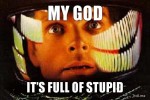I promptly put up a post about the Brussels attacks, but I didn’t say anything about the Ankara attacks. I have excuses: when Turks are attacked by terrorists, my various social network feeds don’t start screaming in panic when Muslims die. But it’s all part of the same phenomenon, our intrinsic tribalism, in which we all reinforce each other in our belief that our people, defined narrowly in a way that excludes much of humanity, are important, and those other people are nobody important. And, unfortunately, as a very privileged American, we have a tendency to not look very far past our own noses.
I don’t know what to do about it, either. If I weep every time someone somewhere within the great mass of humanity commits an evil against another someone in the great mass of humanity, I’d drown in my own tears. So we struggle.
One small thing we’ve done here on FtB is to try and enlist diverse writers, so that maybe as a whole we can fill in the gaps in our individual humanity. And I’m also trying to be more aware and conscious of the entirety of the human experience. But I’ll fail and continue to fail.
That’s no excuse to not try, though.



